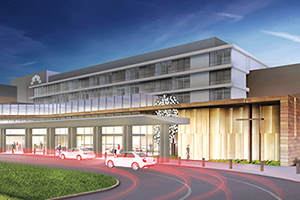By BETSY TAYLOR
Mount Carmel Health System in central Ohio will invest more than $700 million over the next four years to revamp facilities and to strengthen its networks across the continuum of care. Mount Carmel Health System's president and chief executive, Claus von Zychlin, said, "We're actually developing networks that will be responsive to where health care is going, not to where health care has been, or where health care is today."
He said being part of Trinity Health, one of the nation's largest Catholic health care systems, has meant Mount Carmel Health System has been able to draw from Trinity Health's borrowing capacity, benefitting from Trinity's "ability to distribute risk on a national basis rather than a single geographic basis," and to tap into Trinity Health's "intellectual capital."

A rendering shows what Mount Carmel East in Columbus, Ohio, will look like when a $310 million modernization of the hospital is complete in 2019.
That knowledge, about everything from clinical care paths to preferred information technology systems, has been an asset as Mount Carmel Health System planned to modernize its facilities and expand care networks, he said. The changes announced in March are designed to build networks in the greater Columbus area that allow patients to receive care at a convenient location and to improve a patient's experience between care settings.
"One of the beauties of being part of a large system like Trinity is that we're able to make some of these transitions at a faster pace," von Zychlin said. "If you look at the dollars we're talking about here for our significant revamping, that's possible because of being part of a national system like Trinity."
New facilities, shifting services
Among the major changes, Mount Carmel Health System will invest $355 million in its Grove City campus to expand a one-year-old facility into a full service hospital by 2018. The new, 210-bed hospital will expand access in a southwest suburb of Columbus in a rapidly growing part of Central Ohio. Existing emergency and outpatient services on the campus will continue during construction. A 120,000-square-foot medical office building will be built, and the campus will be the headquarters for Mount Carmel's graduate medical education.
Mount Carmel West, located in the Franklinton neighborhood of Columbus on a nearly 130-year-old campus just west of downtown, will transition to focus on primary care, urgent and emergency care. Once the Grove City construction is complete, Mount Carmel West's inpatient services will transfer to Grove City. Mount Carmel West will continue to operate a 24-hour emergency department. About $46 million will be spent to turn the current hospital location into a health and educational campus, where the Mount Carmel College of Nursing will continue.
Because the Mount Carmel West work isn't slated to begin until 2019, von Zychlin said, "We will engage the community a whole lot more in, ultimately, how do we want that campus to shape up?" That input will help determine "the right mix of health services there, what will be the most beneficial."
Another hospital, Mount Carmel East, located on the east side of Columbus, is undergoing a $310 million modernization with work extending through 2019. This project includes a new 5-story patient tower with 128 private patient rooms and renovation of an original 1969 tower to provide 112 private patient rooms. Mount Carmel East will become home to the system's Level II trauma program, which is currently at Mount Carmel West. The health system is moving services to locations where they better serve patients throughout the region, von Zychlin said. "All the trauma programs in the city are within about a 6-mile radius of each other." He said moving the trauma program further away from other existing trauma programs will allow quicker access to trauma services from the east side of Columbus.

von Zychlin
Once the system completes the changes in 2019 or 2020, it will have lowered its total number of inpatient beds to 993 beds from its current 1,152 beds, according to information provided by Mount Carmel Health System's Director of External Affairs Jason Koma. That bed count is for five facilities, also including Mount Carmel St. Ann's and Mount Carmel New Albany. Mount Carmel St. Ann's in Westerville northeast of Columbus has undergone extensive renovation in recent years; Mount Carmel New Albany is a specialty hospital, focused on orthopaedics, neurologic and musculoskeletal care. The lower overall bed count is in keeping with the system's greater focus on outpatient care and wellness, rather than inpatient care, von Zychlin said.
Community needs, community partnerships
Along with the physical changes will come changes in care delivery. Plans call for teams of caregivers to be trained to provide services across the continuum of care, based upon need, von Zychlin said. He said some service lines, such as orthopaedic services and cardiac services, are already starting to be "managed horizontally across the continuum, rather than vertically at each hospital." In these specialties, teams work across all of the system's settings, such as with patients at doctor's offices, clinics and hospitals. They work with patients on preventive care to keep them out of the hospital and also can work with a patient during transitions, such as when a patient needs to be hospitalized or to help the patient transition to post-hospitalization care.
The system's reset is premised on the belief "we can't be everything to everybody," von Zychlin said. Mount Carmel has partnerships with others in the region, including The Ohio State University's Wexner Medical Center, in areas such as neuroscience and rehabilitation programs. "The other part of what we're doing through this network is looking to partner with key players to offer value in a way that we, by ourselves, could not do it," he said.
Copyright © 2015 by the Catholic Health Association
of the United States
For reprint permission, contact Betty Crosby or call (314) 253-3477.